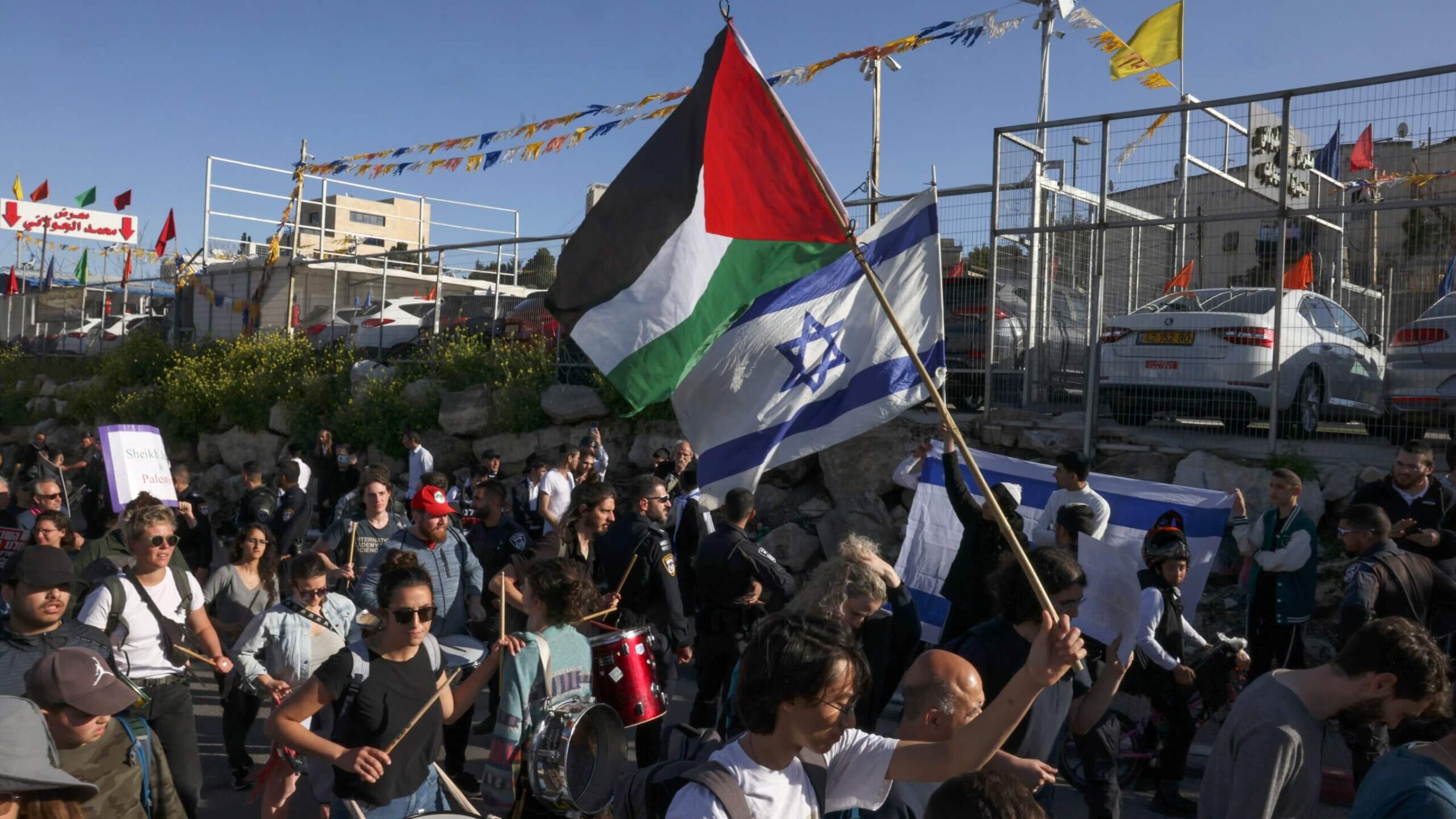Standing up for Israel’s democracy means standing up for Palestinians
Israelis have been in the streets for months. Palestinians and their allies in Sheikh Jarrah have been protesting evictions for 15 years

Israeli settlers lift national flags during a protest by left-wing Israeli activists and Palestinians waving Palestinian flags and banners against Israeli occupation and settlement activity in the neighbourhood of Sheikh Jarrah in Israeli-annexed East Jerusalem, on March 17, 2023. Photo by Hazem Bader/AFP via Getty Images
Out of nowhere, a plainclothes Israeli police officer suddenly struck me on the side of the head and grabbed a tiny Palestinian flag out of my hand.
For eight months, hundreds of thousands of Israelis have been in the streets protesting against their government and fighting for a more democratic country. If you only read the news, you’d never know that another group of Israelis, arguably an even more persistent one, has been protesting for not months, but approximately 15 years.
They protest not on Saturday night but Friday afternoon, and not in Tel Aviv, but in Sheikh Jarrah in East Jerusalem, where settler organizations secretly buy Palestinian homes, evict their long-term residents and move Jewish settlers in. This is the contingent that I, a 67-year-old American Jew, ardent supporter of Israel, civil rights lawyer, and member of the New Israel Fund board, joined a few weeks ago when I was assaulted by the police officer.
The Israeli pro-democracy protest movement’s achievements thus far have been spectacular. They have not only sustained the momentum of these protests, but they have brought them abroad to the U.K., Germany, and this week, to the U.S., where Benjamin Netanyahu — the man they call the “Crime Minister” — visited New York for the United Nations General Assembly.
I am thrilled to see the strength of the protests for Israeli democracy. But I believe that Jewish people everywhere must stand with Palestinians fighting for their rights every bit as much as they stand with those chanting “Demokratia!” (“Democracy!”) on Kaplan Street.
I heard no verbal request by the officer to put down the flag or voluntarily turn it over. I had no weapon, nor did any of the perhaps 100 protesters — no rocks, no sticks or bats. All we had were signs, drums and a single megaphone. The protesters included many women, elderly people (like me) and children. I believe in the state of Israel, and its right to exist in safety and peace. Yet the experience of being attacked without cause by an Israeli police officer has deeply shaken me.
In Sheikh Jarrah, Palestinians live without the right to vote for national elected office, to build homes, to travel freely, or to express their will toward national self-determination — all because the Israeli authorities say so. It is my view that there quite clearly can be no democracy while Israeli military occupation persists.
There is no law that outright prohibits the flying of Palestinian flags in Israel or the West Bank. Yet, somehow, my miniscule flag needed to be confiscated. Sahar Vardi, who works for NIF’s action arm Shatil and who accompanied me to the protest, told me that the week before, the police had seized large Palestinian flags, claiming that they were a “provocation.” When I joined the protestors, the activists brought smaller flags as well as several “alternative” flags: flags that just had Palestinian colors: green, red, white and black, or flags with watermelons on them. In solidarity with those Palestinians who were being evicted from their homes, I had decided to hold a small Palestinian flag and stand towards the back of the group. Each time anyone in the protest stepped off the sidewalk and into the street, police used physical force to push them back on, sometimes knocking them to the ground and arresting anyone who resisted.
The following evening after my assault, I attended a much larger demonstration on Kaplan Street. More than 100,000 people were out in the streets in Tel Aviv. I saw no police presence even though the demonstrators shut down major streets, waved some very large Palestinian flags, and demanded that the government do as they say. The contrast was spectacular.
What has become clear to me in the wake of this experience is that what I was exposed to on Friday at the Sheikh Jarrah protest is just a taste of what Palestinians experience every day living in the occupied territories including East Jerusalem. The settler movement has set its sights on Sheikh Jarrah and, supported by American funding, is working strategically to evict Palestinian families who have lived there for decades in order to replace them with Jewish settlers.
Ultimately, it is not surprising that the police treated me so differently in Sheikh Jarrah than they did on Kaplan Street. In East Jerusalem, the police see their job as protecting Jews — the settlers — not the Palestinians and those who ally with them. On Kaplan Street, the dynamic is different. There is talk of brotherhood and sisterhood despite differences. There are instances of violence, certainly, but they are widely publicized.
There is no doubt that it is critical to protest on Kaplan Street, but it seems equally clear that it is incumbent upon Jews everywhere to protest alongside Palestinians in the same way. We cannot expect democracy without rights for all.
After attending both protests, I can see that now — in the midst of crisis — is the time to build the future that the vast majority of American Jews and so many Israelis want to see: one where Israeli Jews and Palestinians work together to establish a true democracy; one that offers equality and the right to protest to everyone.
To contact the author, email [email protected].















